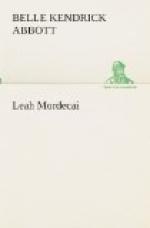These words, so full of feeling, so sorrowfully spoken, too, struck deep into the father’s heart, and filled him with unspeakable regret.
“Ready to leave me, daughter,” he reiterated, half petulantly, “I fear that you do not appreciate, or rather that you misinterpret my motive in sending you on so grand a journey. How many girls there are who vainly wish, from day to day, for such advantages as I am offering you!”
To these words Leah made no reply. And Mr. Mordecai, walking backward and forward with restless step across his daughter’s bed-chamber, secretly regretted that he had ever considered the project for a moment. Then he said, half apologetically, “You shall only stay a year, my daughter; that is not such a very long time.”
“Maybe I shall never come back, father. But you will love me always, won’t you?”
“Hush! hush! child. I do not like your words. They distress me! A year is a short time, you know; so don’t be foolish. Come, braid up your hair, arrange your dress, and come down at once into the drawing-room. I must have some music to-night.”
“With pleasure, dear father,” answered Leah, as cheerfully as the swelling emotion at her heart would allow. Then, in an undertone to herself, she added, “It may be the last time I shall have the privilege of playing for him in my life. If I were to go to Europe, that wretched woman would devise some plan to keep me there, and so I’ll stay with—” the last word she uttered was spoken in a whisper, and scarce escaped her lips. Hastily obeying her father’s summous, after arranging a becoming toilet, Leah descended to the drawing-room, where Mr. Mordecai awaited her. “Father,” said Leah abruptly, as she was turning to her music, “to-day, in looking over a package of papers, I came across the cards of cousin Hannah Stuyvesant; I had not thought of her for ever so long. Who was it she married?”
“Oh! A Christian dog! A renegade. Somebody named Bliss, I believe.”
“Did they prosper, father?”
“I’ll venture to say not, but I do not know positively. I’ve known nothing of her since she so far renounced her people as to marry a Christian. Neither have I desired to know anything of her.”
At these words of Mr. Mordecai-significant words-Leah stationed herself at the instrument, and, with mind absorbed, and thoughts far away from the music, she performed mechanically piece after piece, as her father would request. The tea-bell at last summoned the family to the evening meal, and encircling his daughter with his arm, Mr. Mordecai led the way to the waiting repast. This was the last evening meal of the banker’s family, unbroken. Yet who could have said so on that memorable evening in the long ago?




